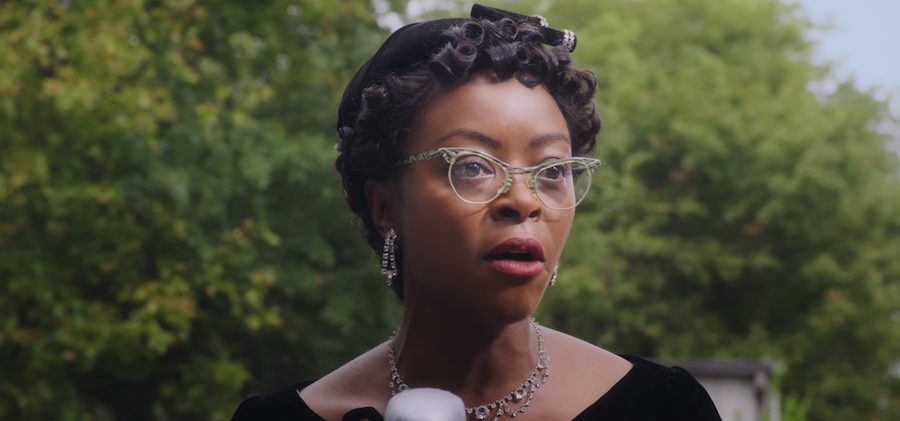by Nathaniel R
 Danielle Deadwyler in "Till"
Danielle Deadwyler in "Till"
Often times Oscar buzz arrives before a performance seen on the basis that the role will be a) meaty b) important-feeling and c) feature typically awards-friendly elements. There's a reason this happens frequently. Voters of all awards bodies, not just the Academy, are sometimes guilty of awarding the role in question rather than thinking about what the actor actually did with their big opportunity. The unfortunate byproduct of this is that sometimes, no matter how much an actor elevates it, people might assume "well, it was the role". In these scenarios even the enthusiasm around the performance can feel a little rote because it's expected. It arguably happens with most biopic roles now. The role of Mamie Till-Mobely, the mother of Emmett Till who channeled her grief at her son's murder into Civil Rights activism, meets all those pre-release requirements for buzz and a likely nomination even if Danielle Deadwyler hadn't been incredible. The very good news is that she most definitely is...
The movie's first few scenes in Chicago, with Mamie helping young Emmett get ready for a trip to Mississippi to visit his cousins, lay the foreshadowing on thickly. Even Deadwyler, otherwise impeccable, arguably pushes this too hard with Mamie falling apart with worry for more than a full week before the murder. Since everyone watching already knows what's coming, it would be better if the movie characters in 1955 didn't quite.

Director Chinonye Chukwu makes the very wise decision not to show Emmett's murder or discuss the horrific details. In the film's only indelible moment without Mamie, everyone around Emmett (Jalyn Hall) goes deadly silent when they witness his interaction with the white woman Carolyn Bryant (Haley Bennett) outside a grocery store in 1955 Mississippi. His look of little boy confusion is traumatic enough to watch. We know and the Black townspeople around him, already know that violence that will follow.
Till also makes an admirable choice to go in the opposite direction of the current (extremely tired) fashion that says that movies must be under lit and drained of color in order to be taken seriously. Unfortunately the execution doesn't pay off, tilting too far into brightness. Nearly the entire movie has the kind of constant sunniness that you'd only want from a summer vacation.
In the end Till can't escape the common pitfalls of movies of its ilk, weighed down to stiffness by noble intent, important message and broad signifiers. Till only thrives as a dramatic experience when Deadwyler is activated and humanizing it (which is thankfully much of the picture). Those who saw the actress just last year in the western The Harder They Fall have the added benefit of sheer awe at her range. The two characters are nothing alike but both three-dimensional.
The first sign that Deadwyler has not just risen to the new opportunity but elevated it from the page is the absolute gut-punch when Mamie sees her son's coffin. She doesn't just cry painfully. Her whole body joins in the wailing agony. It's incredibly discomfitting, even alienating, to witness, as real life intense mourning can sometimes be even for the people who love you who can't know this specific pain. She reminds you how rarely we see primal emotion onscreen.

Elsewhere, whether she's playing a simple interaction scene or a Big Moment, she's working the character fully. Deadwyler draws you in tightly, without regard to your perceptions of American History or Screen Heroism. The result is that you're not so much protective of Mamie or in awe of the way she's alchemizing grief into activism, but right in it with her deferring to the fluctuations of her emotional temperature. And how they fluctuate. Deadwyler is rarely just offering one thing well, as solid but uninspired actors sometimes do in roles or scenes that call for big emotions. Instead she's giving you the big wave, its roiling undercurrent, and the reflections on its surface from her stormy environment.
Till: B- / Danielle Deadwyler: A
Best Actress Chart